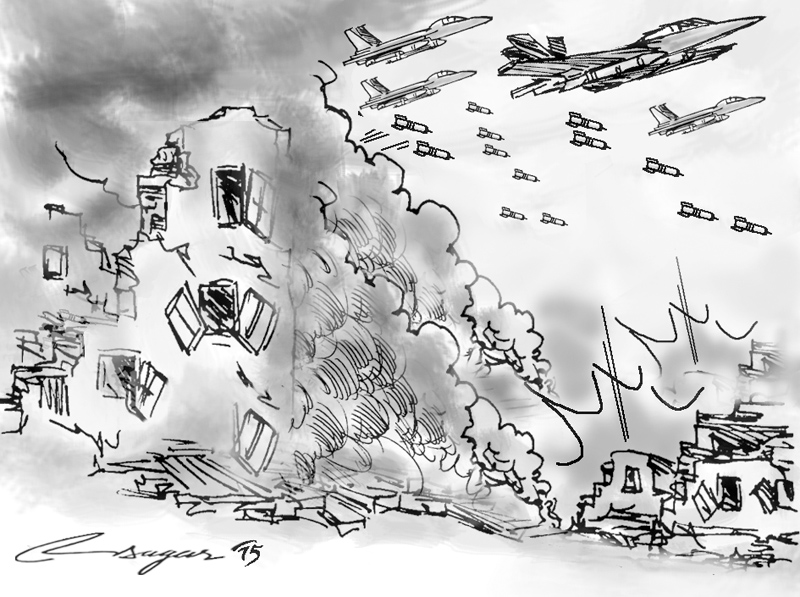Anti-Western terror Its Western roots
Though Russia is pursuing its military campaign independently of the Western power, it, too, has apparently become a target, with US and European officials increasingly convinced that the IS was behind October’s crash of a Russian airliner
The Islamic State’s horrific attacks in Paris provide a stark reminder that Western powers cannot contain – let alone insulate themselves from – the unintended consequences of their interventions in the Middle East. The unraveling of Syria, Iraq, and Libya, together with the civil war that is tearing Yemen apart, have created vast killing fields, generated waves of refugees, and spawned Islamist militants who will remain a threat to international security for years to come. And the West has had more than a little to do with it.
Obviously, Western intervention in the Middle East is not a new phenomenon. With the exceptions of Iran, Egypt, and Turkey, every major power in the Middle East is a modern construct created largely by the British and the French. The United States-led interventions in Afghanistan and Iraq since 2001 represent only the most recent effort by Western powers to shape the region’s geopolitics.
But these powers have always preferred intervention by proxy, and it is this strategy – training, funding, and arming jihadists who are deemed “moderate” to fight against the “radicals” – that is backfiring today. Despite repeated proof to the contrary, Western powers have remained wedded to an approach that endangers their own internal security.
France, too, has distributed aid to Syrian rebels, and it recently began launching airstrikes against the Islamic State. And that is precisely why France was targeted. According to witnesses, the attackers at Paris’s Bataclan concert hall – where most of the night’s victims were killed – declared that their actions were President François Hollande’s fault. “He didn’t have to intervene in Syria,” they shouted.
France has a tradition of independent-minded and pragmatic foreign policy, reflected in its opposition to the 2003 US-led invasion and occupation of Iraq. But after Nicolas Sarkozy became President in 2007, France aligned its policies more firmly with the US and NATO, and participated actively in toppling Libyan leader Muammar el-Qaddafi in 2011. And after Hollande succeeded Sarkozy in 2012, France emerged as one of the world’s most interventionist countries, undertaking military operations in the Central African Republic, the Ivory Coast, Mali, the Sahel, and Somalia before launching its airstrikes in Syria. Such interventions neglect the lessons of history. Simply put, nearly every Western intervention this century has had unforeseen consequences, which have spilled over borders and ultimately prompted another intervention.
It was no different in the late twentieth century. In the 1980s, under President Ronald Reagan, the US (with funding from Saudi Arabia) trained thousands of Islamic extremists to fight against the Soviet Union in Afghanistan. The result was Al Qaeda, whose actions ultimately prompted President George W. Bush’s invasion of Afghanistan and provided a pretext for invading Iraq. As then-Secretary of State Hillary Clinton admitted in 2010, “We trained them, we equipped them, we funded them, including somebody named Osama bin Laden….And it didn’t work out so well for us.” And yet, disregarding this lesson, Western powers intervened in Libya to topple Qaddafi, effectively creating a jihadist citadel at Europe’s southern doorstep, while opening the way for arms and militants to flow to other countries. It was this fallout that spurred the French counter-terrorist interventions in Mali and the Sahel.
Having barely stopped to catch their breath, the US, France, and Britain – with the support of Wahhabi states like Saudi Arabia and Qatar – then moved to bring down Syrian President Bashar al-Assad, fueling a civil war that enabled the Islamic State to seize territory and flourish. With the group rapidly gaining control over vast areas extending into Iraq, the US – along with Bahrain, Jordan, Qatar, Saudi Arabia, and the United Arab Emirates – began launching airstrikes inside Syria last year. France joined the effort more recently, as has Russia. Though Russia is pursuing its military campaign independently of the Western powers (reflecting its support for Assad), it, too, has apparently become a target, with US and European officials increasingly convinced that the Islamic State was behind October’s crash of a Russian airliner in the Sinai Peninsula.
What is needed most is a more measured approach that reflects the lessons of recent mistakes. For starters, Western leaders should avoid playing into the terrorists’ hands, as Hollande is doing by calling the Paris attacks “an act of war” and implementing unprecedented measures at home. Instead, they should heed Margaret Thatcher’s advice and starve terrorists of “the oxygen of publicity on which they depend.”
More important, they should recognize that the war on terror cannot credibly be fought with unsavory allies, such as Islamist fighters or fundamentalist-financing sheikhdoms. The risk of adverse unintended consequences – whether terrorist blowback, as in Paris, or military spillovers, as in Syria – is unjustifiably high.
It is not too late for Western powers to consider the lessons of past mistakes and recalibrate their counterterrorism policies accordingly. Unfortunately, this appears to be the least likely response to the Islamic State’s recent attacks.
Chellaney is Professor of Strategic Studies at the New Delhi-based Center for Policy Research and Fellow at the Robert Bosch Academy in Berlin.






